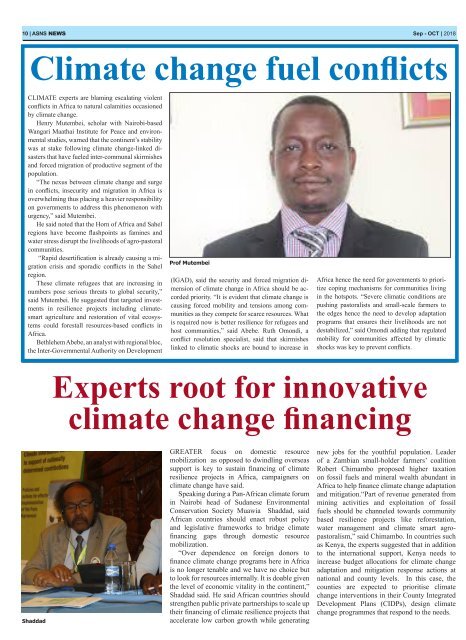The African Science
Covering African science with an African eye
Covering African science with an African eye
You also want an ePaper? Increase the reach of your titles
YUMPU automatically turns print PDFs into web optimized ePapers that Google loves.
10 | ASNS NEWS Sep - OCT | 2018<br />
Climate change fuel conflicts<br />
Climate experts are blaming escalating violent<br />
conflicts in Africa to natural calamities occasioned<br />
by climate change.<br />
Henry Mutembei, scholar with Nairobi-based<br />
Wangari Maathai Institute for Peace and environmental<br />
studies, warned that the continent’s stability<br />
was at stake following climate change-linked disasters<br />
that have fueled inter-communal skirmishes<br />
and forced migration of productive segment of the<br />
population.<br />
“<strong>The</strong> nexus between climate change and surge<br />
in conflicts, insecurity and migration in Africa is<br />
overwhelming thus placing a heavier responsibility<br />
on governments to address this phenomenon with<br />
urgency,” said Mutembei.<br />
He said noted that the Horn of Africa and Sahel<br />
regions have become flashpoints as famines and<br />
water stress disrupt the livelihoods of agro-pastoral<br />
communities.<br />
“Rapid desertification is already causing a migration<br />
crisis and sporadic conflicts in the Sahel<br />
region.<br />
<strong>The</strong>se climate refugees that are increasing in<br />
numbers pose serious threats to global security,”<br />
said Mutembei. He suggested that targeted investments<br />
in resilience projects including climatesmart<br />
agriculture and restoration of vital ecosystems<br />
could forestall resources-based conflicts in<br />
Africa.<br />
Bethlehem Abebe, an analyst with regional bloc,<br />
the Inter-Governmental Authority on Development<br />
Prof Mutembei<br />
(IGAD), said the security and forced migration dimension<br />
of climate change in Africa should be accorded<br />
priority. “It is evident that climate change is<br />
causing forced mobility and tensions among communities<br />
as they compete for scarce resources. What<br />
is required now is better resilience for refugees and<br />
host communities,” said Abebe. Ruth Omondi, a<br />
conflict resolution specialist, said that skirmishes<br />
linked to climatic shocks are bound to increase in<br />
Africa hence the need for governments to prioritize<br />
coping mechanisms for communities living<br />
in the hotspots. “Severe climatic conditions are<br />
pushing pastoralists and small-scale farmers to<br />
the edges hence the need to develop adaptation<br />
programs that ensures their livelihoods are not<br />
destabilized,” said Omondi adding that regulated<br />
mobility for communities affected by climatic<br />
shocks was key to prevent conflicts.<br />
Experts root for innovative<br />
climate change financing<br />
Shaddad<br />
Greater focus on domestic resource<br />
mobilization as opposed to dwindling overseas<br />
support is key to sustain financing of climate<br />
resilience projects in Africa, campaigners on<br />
climate change have said.<br />
Speaking during a Pan-<strong>African</strong> climate forum<br />
in Nairobi head of Sudanese Environmental<br />
Conservation Society Muawia Shaddad, said<br />
<strong>African</strong> countries should enact robust policy<br />
and legislative frameworks to bridge climate<br />
financing gaps through domestic resource<br />
mobilization.<br />
“Over dependence on foreign donors to<br />
finance climate change programs here in Africa<br />
is no longer tenable and we have no choice but<br />
to look for resources internally. It is doable given<br />
the level of economic vitality in the continent,”<br />
Shaddad said. He said <strong>African</strong> countries should<br />
strengthen public private partnerships to scale up<br />
their financing of climate resilience projects that<br />
accelerate low carbon growth while generating<br />
new jobs for the youthful population. Leader<br />
of a Zambian small-holder farmers’ coalition<br />
Robert Chimambo proposed higher taxation<br />
on fossil fuels and mineral wealth abundant in<br />
Africa to help finance climate change adaptation<br />
and mitigation.“Part of revenue generated from<br />
mining activities and exploitation of fossil<br />
fuels should be channeled towards community<br />
based resilience projects like reforestation,<br />
water management and climate smart agropastoralism,”<br />
said Chimambo. In countries such<br />
as Kenya, the experts suggested that in addition<br />
to the international support, Kenya needs to<br />
increase budget allocations for climate change<br />
adaptation and mitigation response actions at<br />
national and county levels. In this case, the<br />
counties are expected to prioritise climate<br />
change interventions in their County Integrated<br />
Development Plans (CIDPs), design climate<br />
change programmes that respond to the needs.



